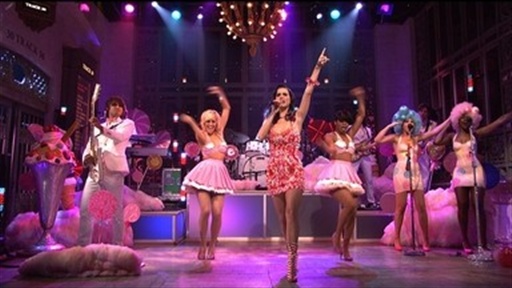

I just watched (OK, intermittently fast-forwarded though) '50 Top Alternative Anthems' on MTV Classic (down under). That list, which was topped by Creep, Seven Nation Army, and Love Will Tear Us Apart, also included Gnarls Barkley's Crazy, Outkast's Hey Ya, Oasis's Wonderwall, and The Verve's Bittersweet Symphony. But all of the latter were among the broadest of mainstream hits of their respective years. Each sold massively to everyone from hipsters to Grannies, all over the world, just as they were intended. One possibility is, then, that the always somewhat suspicious 'alternative' label has become completely meaningless and unhelpful.
But here's another possibility suggested by listening to the NPR: Planet Money (streamable/downloadable) podcast on Rihanna and contemporary (paradigmatically summer) hit-making. Music that's written, performed, and produced overwhelmingly by the artist/group his/her/itself (or jointly with a single Producer/Engineer team - say roughly along the lines of a George Martin or a Brian Eno or a Nigel Godrich) counts as 'alternative'. It's (broadly) individually expressive compared to the corporate/industrial/Darwinian/networked/distributed (it's not clear which if any of these descriptors is the right one!) model that Rihanna et al. use. The latter is proudly as close as possible to being purely expressive of/written by/a function of the market and the zeitgeist. The purpose of an outsize visual personality/front end (Rihanna, Xtina, Ke$ha, Katy Perry, Kylie, etc...) in this model is to hide/distract from/make bearable the genericness/impersonality of the product. It says something about how popular music has evolved that formerly mainstream, ambitious outfits like Outkast and Gnarls and Oasis are starting to look like crazy DIY romantic freaks. It's the same evolution that's happened in movies: former epitomes of mainstream mass-entertainment direction such as Cameron and Spielberg start to look like wild-eyed romantic individualist auteurs next to the truly cynical, corporate ministrations of Sherlock Holmes Bastardized 2, Pirates 4-Eva, Marvel Comic Extrusion/Reboot/Carbuncle 2, etc.. Hence, Dana Stevens's quip about the contemporary movie situation: "Big, A-list movies that lack 3-D and a toy tie-in are the new scruffy indies".
No comments:
Post a Comment